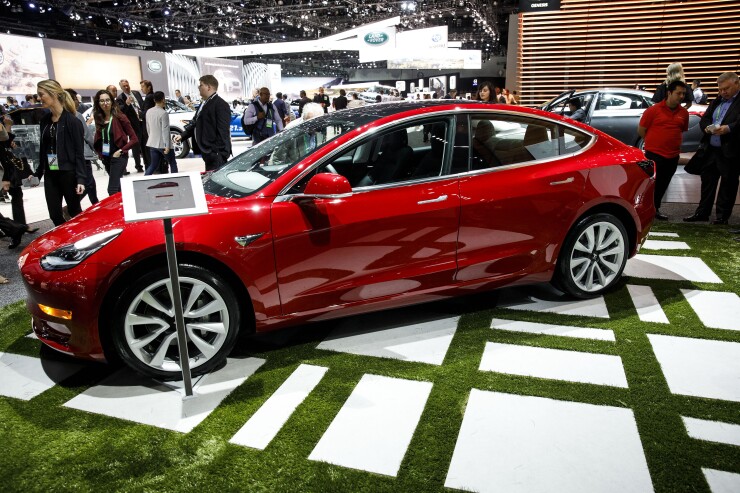Tesla Inc. is returning to the auto-lease securitization market for the first time since late last year with a nearly $1 billion offering thanks to a sudden turnaround in its financial fortunes.
Tesla’s sponsorship of the $940.95 million Tesla Auto Lease Trust 2019-A comes as the battery-electric vehicle (BEV) manufacturer has regained its footing with a surprise third-quarter profit and overcome recent manufacturing woes on its mass-market Model 3 vehicle.
The notes sale will raise capital for the company (Nasdaq: TSLA) to strengthen its existing $5 billion cash position as it sets about to expand its European presence and launch BEV sales efforts in China.
Tesla’s first auto-lease securitization in nearly a year will be paid through proceeds from receivables on a pool of 31,726 auto leases underwritten by Tesla Finance for each of Tesla’s three vehicle models. The receivables consist of remaining monthly lease payments plus the expected residual value of the vehicles upon the maturity of the lease contracts.
The auto-lease securitization will be Tesla’s third public ABS offering overall and its largest to date; the company raised $546 million in January 2018, and
Moody’s Investors Service has assigned preliminary Aaa ratings to three tranches of term senior notes: the Class A2 notes totaling $260 million, due in April 2022; Class A3 notes totaling $240 million, due in October 2022; and an $81.89 million Class A4 tranche, due in November 2022.
Moody’s also gave the $105 million Class A-1 money-market tranche its highest short-term rating of P-1.
The four subordinate classes are $61.16 million Class B notes due in December 2022 with an Aa2 rating; $37.63 million in Class C notes due in January 2023 with an A2 rating; a $36.7 million Class D notes tranche due in January 2023 with a Baa2 rating; and a $38.8 million Class E tranche with a Ba3 rating, due in April 2023.
Tesla will retain $79.99 million in Class F notes for risk-retention purposes through a majority-owned affiliate.
The notes will be secured in part by the payments from 18,503 contracts, or slightly more than half of the 31,726 leases that Tesla held in its $2.3 billion managed portfolio as of Sept. 30. The leases have original terms of 35 months and a five-month average seasoning, with about $50,854 due on each one (based on the cumulative securitization value of the leases). About 42% are for Model 3 vehicles.
Moody’s forecast modest losses of just 0.5% on the notes, in line with the lease securitizations of other global automakers including Ford, BMW and Daimler AG’s Mercedes-Benz.
Moody’s presale report states the deal is strengthened by the high credit quality of the customers entering the lease pacts: the weighted average FICO of the transaction is 790, which is higher than comparable lease ABS pools of luxury carmakers.

In addition, Tesla will build up the credit enhancement levels of the pool up to an additional 3% as the notes are paid down, ensuring that the remaining notes will have additional overcollateralization buffers against losses later in the life of the transaction.
But Moody’s cautions the deal has risks based on Tesla’s low credit ratings (a speculative-grade corporate B3 rating as well as a Caa1 rating on its outstanding unsecured notes). The transaction is also complicated by the limited history (and available data) on resale values of used Tesla vehicles.
There is limited information on used values for the high-end Model S (MSRP $97,914) and Model X SUV ($105,068) lines, and “almost no data” on the more affordable — and more recently launched — Model 3 line ($47,355), according to Moody's.
Values for Model 3's (which went on the market last February) may be further clouded in the future by the fact lessees will not be given a purchase option when a contract ends, according to Moody’s, and few of these vehicles have been sold through auctions. Moody’s modeled its ratings based on expectations the vehicles will carry at least 55% of their original retail price.
In addition, Tesla “faces important governance, financial and operational challenges,” Moody’s presale report continued. “Securitizations backed by leases from smaller, more specialized and financially weaker manufacturers are more susceptible to event risk than those backed by stronger and more diversified incumbent manufacturers that are supported as a result of greater vehicle diversification and higher manufacturer durability.”
But in August, Moody’s noted the company’s Model 3 output was back in line with earlier expectations, and the company was on target to reduce debt and gain “modestly positive” cash flow by next year. Last month, the company surprised analysts with a $143 million profit on $6.3 billion in losses, leading to a 20% surge in share prices for Tesla.
“Moody's expects free cash flow to turn modestly positive during 2020,” and year-end leverage — forecast for 8.3x this year — is expected to fall below 6x by next year, the agency said in an August credit update on Tesla.





